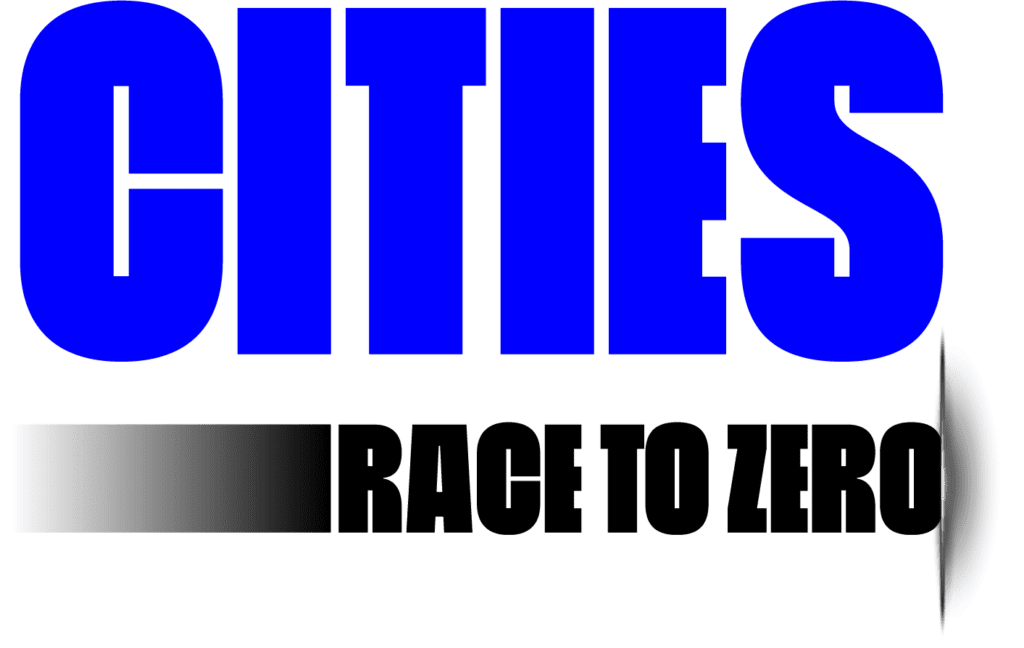Working Harder, Faster for Climate
Race to Zero is a movement of local governments across the ICLEI U.S. network stepping up to join the UNFCCC Cities Race to Zero.

There Are
Respond to the moment. Be recognized for real action.
Race to Zero is ICLEI’s long-term commitment to helping you achieve your 2030 target and then your climate neutrality by 2050.
The Race to Zero
Race To Zero is a global campaign established by United Nations Climate and UK COP26 Climate Champions during Fall 2020 in order to rally ambitious leadership from all sectors of society — businesses, cities, regions, investors — in order to secure a future of warming that exceeds no more than 1.5 °C.
The science shows us that governments are crucial partners in solving the climate emergency but that they must strengthen their contributions to the Paris Agreement in order to unlock a healthy, resilient, zero carbon recovery that prevents future threats, creates decent jobs, and unlocks inclusive, sustainable growth. Although the Race to Zero was born out of the galvanizing sense of urgency leading into COP26, the imperative for communities to reach climate neutrality will continue for decades to come. ICLEI USA invites all our members to do this work with us, join the Race to Zero, and access our dedicated technical support program to reach your 2030 and 2050 climate goals.
The Cities Race to Zero is a collaboration between ICLEI, C40 Cities, Global Covenant of Mayors, CDP, UCLG, WRI and WWF.

Join the Movement
Pledge
to reduce GHG emissions to zero by 2050 and set a interim 2030 target.
Plan
the actions to achieve both the 2030 and 2050 targets within 12 months of joining
Proceed
with high-impact action to achieve the targets during 2021
Publish
and report Race to Zero targets, actions, and progress
Your Race to Zero Support
Pledge to Meet the Climate Crisis
ICLEI will support your Science-Based Target developement
1. Pledge at the head-of-organization level to reach (net) zero greenhouse gas emissions as soon as possible and by 2050 at the latest.
2. Set an interim 2030 target that reflects maximum effort toward or beyond a fair share of 50% CO2 reductions by 2030.
Set 2030 Science-Based Target
If you have a complete 2016 or newer community greenhouse gas inventory, ICLEI’s technical experts will calculate your science-based target (SBT). This target is the level of emissions your city or county must reduce to achieve your fair share of the Paris climate goals.
If you do not have an applicable inventory, ICLEI will help you create or update it.
Act Now: High Impact Action
ICLEI Will Identify Community-Specific High Impact Actions
Using your community’s 2030 science-based target and greenhouse gas profile, as well as our knowledge of your community priorities, ICLEI’s technical staff will meet with your team to develop high-impact actions to achieve the 2030 target.
Once identified, ICLEI will provide technical assistance and workshops to help your team begin implementation.
Let the World Know Your Progress
Reporting Will Develop Internal and External Support
Reporting your progress allows ICLEI and your team to co-develop the next steps in your journey. ICLEI will amplify your progress through its media and partner channels.
FAQ
Local governments can make this pledge via any official documentation such as a council decision, commission decision, or strategy paper. For inspiration, see Ann Arbor, MI’s A2Zero Carbon Neutrality Plan; Pittsburgh, PA’s Carbon Neutral by 2050 Executive Order; and Montgomery County, MA’s Emergency Climate Mobilization Resolution. Notify ICLEI of this pledge.
Science-Based Targets are calculated climate goals, in line with the latest climate science, that represent your community’s fair share of the ambition necessary to meet the Paris Agreement commitment of keeping warming below 1.5°C. To achieve this goal, the Intergovernmental Panel on Climate Change (IPCC) states that we must reduce global emissions by 50% by 2030 and achieve climate neutrality by 2050. Equitably reducing global emissions by 50% requires that high-emitting, wealthy nations reduce their emissions by more than 50%.
Calculating the target requires the following inputs:
- Your community’s GHG emissions inventory (between 2016 and 2019)
- Your community’s current and projected population growth
- The United States’ Human Development Index (HDI)
- The planetary emissions carbon budget available to limit global temperature rise to 1.5°C above pre-industrial levels. This is the level of maximum warming recommended by the IPPC and agreed to by 195 country-signatories of the Paris Climate Agreement.
Science-Based Targets build internal and external support to achieve the target and boosts public confidence in local climate action. They show local governments what they need to do by 2030 and 2050, spurring innovation and collaboration.
ICLEI’s Carbon Neutrality Framework and ClearPath planning module will support high-impact actions. ICLEI will draw from and leverage our partners, including American Cities Climate Challenge, America’s Pledge, C40 Green and Just Recovery, Project Drawdown, and many others.
Race to Zero participants are invited to participate in ICLEI’s technical assistance workshops targeting high-impact actions. Topics may include building electrification, strategies for working with your utility provider, electric vehicle charging infrastructure, etc.
Race to Zero Work Plan
Embrace the Challenge and Opportunity
Implement high-impact emissions reduction initiatives that will clean up your air, create local jobs, and spur local innovation and investment

